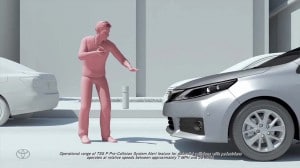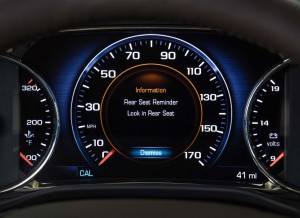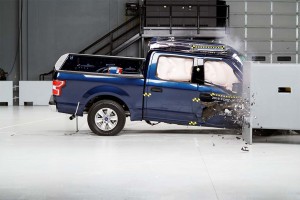
The Moving Forward Act would require automakers to make a variety of safety technology standard, including automatic emergency braking.
The Trump administration as well as Congress have been offering up some pricey plans to help move the country back toward economic stability in the wake of the coronavirus pandemic. The Moving Forward Act is the first of these sweeping reform packages was recently introduced, and it offers some surprising impact on the auto industry.
Formally titled H.R. 2, the Moving Forward Act is a $1.5 trillion plan to rebuild American infrastructure. This is a broadbased bill providing funds for roads, bridges and transit systems. However, it doesn’t stop there as it includes funding for schools, housing, broadband access, and more.
The “more” is the part is funding and mandates for a variety of safety and security measures ranging from making emergency braking standard to bolstering the safety information about new vehicles and more. The bill, if passed, would require a slew of new safety technology for new cars, trucks, crossovers, sport-utility vehicles and commercial vehicles.
(SUVs kill pedestrians at higher rate than cars, study shows.)
A group of automotive safety advocates gathered June 23 to throw their support behind the new legislation, particularly the new auto safety components.

Safety systems designed to warn drivers that there are passengers in the rear seat when they exit the vehicle would become standard equipment..
Cathy Chase, president, Advocates for Highway and Auto Safety described it as “a legislative package that contains commonsense policy improvements to address the persistently high death and injury toll. Last year, 36,120 people were killed in crashes, and millions more are injured on our roadways every year, at a comprehensive annual cost to society of over $800 billion.”
The bill makes some safety equipment required on new vehicles, including:
- Driver assistance technology, such as automatic emergency braking
- Systems to detect alcohol impairment and provide alerts or shut down a vehicle if necessary
- Systems to detect and warn of the presence of a rear-seat occupant
- Automatic shutoffs for keyless ignition systems
The bill would also require improvements to the New Car Assessment Program, in particular the star rating system for safety. Advocates of the new bill want tougher crash-testing standards from the National Highway Traffic Safety Administration.
(Pedestrian fatalities continue rising – setting record for second consecutive years.)
“This program was designed to provide incentives for automakers to improve the safety of new cars and offer consumers important information about vehicle performance in crash tests,” said former NHTSA Administrator and Advocates’ Board Member Joan Claybrook, who led the effort to create U.S. NCAP. “This essential information is already required on the price sticker in the showroom, but it now is seriously outdated.”

If passed, the Moving Forward Act would force the New Car Assessment Program to have tougher standards.
Tied to the improved rating system is the call for a safer vehicle overall through the use of technology. The act would mandate the installation of advanced driver assistance technologies, starting with automatic emergency braking, lane departure warning and blind spot warning.
“The reason the National Transportation Safety Board has recommended proven collision avoidance technologies is because they are a vital tool to increase auto safety, including combatting the frightening increase in pedestrian deaths,” said Jason Levine, executive director of the Center for Auto Safety and Advocates’ Board of Directors member.
“Combined with driver assist features aimed at limiting dangerous automation complacency and research into technology to assist first responders in saving lives more quickly after car crashes, this bill will improve the safety of all drivers, passengers, and pedestrians.”
(U.S. highway deaths declined in 2019.)
One vehicle type not commonly considered when it comes to transportation safety is the limousine. The legislation even has a carve out for amending the safety standards, including requiring seat belts for all passengers.
